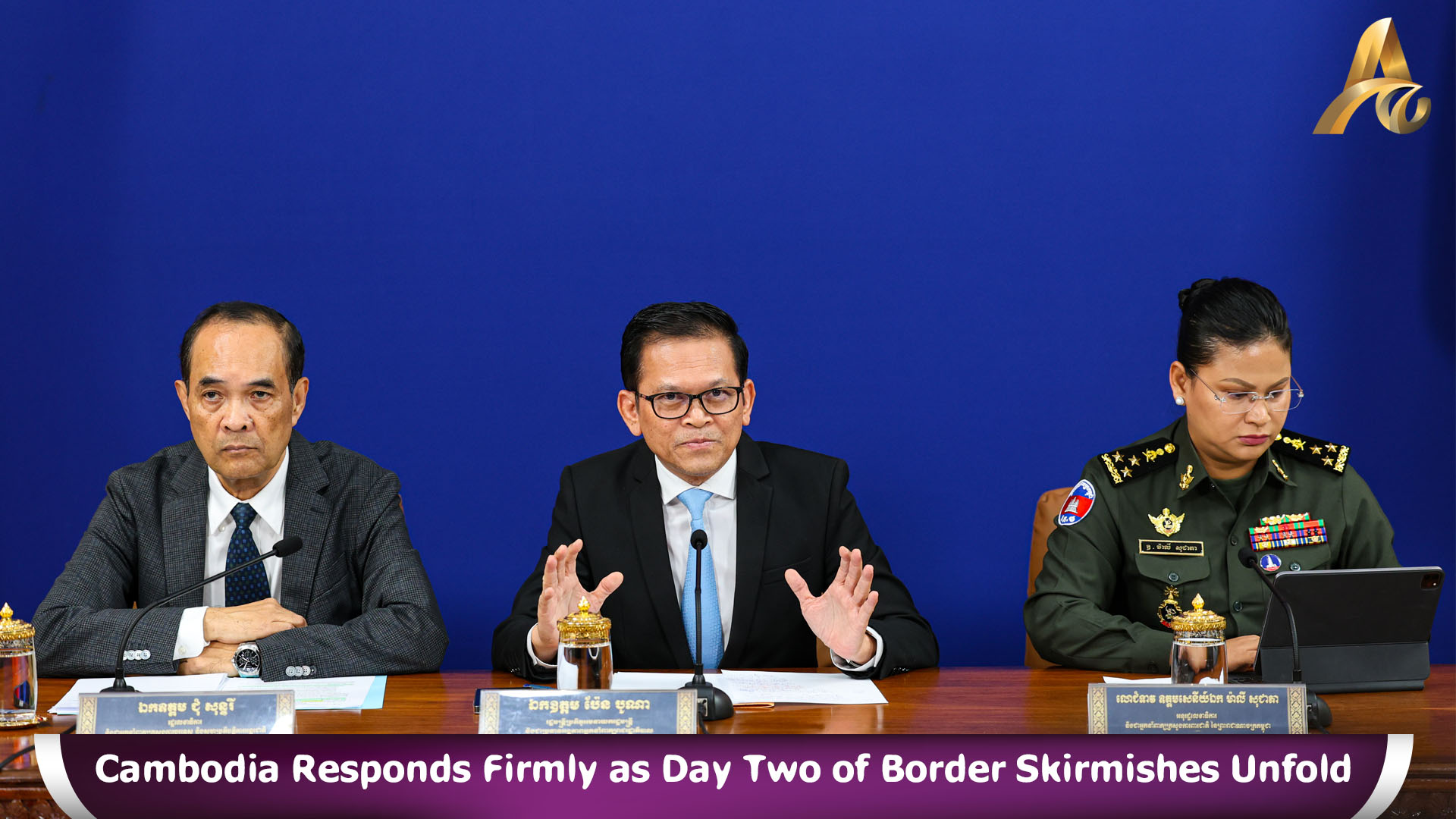Phnom Penh: In evening today, government officials held a tense and detailed briefing to update the nation on the ongoing border conflict with Thailand, now entering its second day. As the conflict escalates, the officials reaffirmed Cambodia’s firm stance on defending its sovereignty and criticized Thailand’s aggression.
 Minister attached to the Prime Minister, Pen Bona, opened the briefing by describing the situation over the past two days. He explained that Thai soldiers had continued to fire on Cambodian territory, prompting Cambodia to exercise its legal right to self-defense. He emphasized that Thailand’s actions appeared to be a deliberate invasion, with troops using heavy weapons, fighter jets, and cluster bombs against Cambodian positions.
Minister attached to the Prime Minister, Pen Bona, opened the briefing by describing the situation over the past two days. He explained that Thai soldiers had continued to fire on Cambodian territory, prompting Cambodia to exercise its legal right to self-defense. He emphasized that Thailand’s actions appeared to be a deliberate invasion, with troops using heavy weapons, fighter jets, and cluster bombs against Cambodian positions.
Mr. Pen Bona highlighted the heroic efforts of the Cambodian armed forces, who have valiantly defended the nation’s territory under the leadership of the King and the Royal Government. “The unity of the Khmer people, from all walks of life, stands strongly behind our brave soldiers,” he declared. The Minister expressed confidence that Cambodia’s resolve remains unshaken as the armed forces continue to stand firm against invaders.
 Following this, Lieutenant General Maly Socheata, spokesperson for the Ministry of National Defense, provided a detailed account of the military situation on July 25. She reported that Thai forces had attacked seven locations, including Phnom Trop, Tathav, Takrabei, Phnom Khmaoch, Ta Moan, and Ta Krabey, employing heavy artillery, tanks, and cluster bombs. She revealed that Thai aircraft had dropped bombs in two key areas—Preah Vihear and Takrabei—firing four times in total, with strikes occurring at 12:30 p.m., 12:40 p.m., and 12:45 p.m.
Following this, Lieutenant General Maly Socheata, spokesperson for the Ministry of National Defense, provided a detailed account of the military situation on July 25. She reported that Thai forces had attacked seven locations, including Phnom Trop, Tathav, Takrabei, Phnom Khmaoch, Ta Moan, and Ta Krabey, employing heavy artillery, tanks, and cluster bombs. She revealed that Thai aircraft had dropped bombs in two key areas—Preah Vihear and Takrabei—firing four times in total, with strikes occurring at 12:30 p.m., 12:40 p.m., and 12:45 p.m.
Lieutenant General Maly Socheata, condemned the use of cluster munitions, describing this act as a “grave violation of international law” that poses lasting threats to civilians and the environment. She reassured the public that Cambodia’s military was acting within the bounds of international law, targeting only military objectives while protecting civilians. She also reported that civilians had been injured, including children, and that a school in Banteay Ampil District was struck by shells, raising further alarm over the humanitarian toll of the conflict.
 In the diplomatic arena, Mr. Chum Sonry, spokesperson for the Ministry of Foreign Affairs and International Cooperation, shared details about recent diplomatic efforts. He recounted that Cambodian Foreign Minister Prak Sokhonn held a meeting with diplomats and military attachés to update them on the situation after Thailand’s invasion of key sites such as Ta Moan, Ta Krabey, and Preah Vihear. Cambodia reiterated its strong condemnation of Thailand’s actions as serious violations of international law and regional stability.
In the diplomatic arena, Mr. Chum Sonry, spokesperson for the Ministry of Foreign Affairs and International Cooperation, shared details about recent diplomatic efforts. He recounted that Cambodian Foreign Minister Prak Sokhonn held a meeting with diplomats and military attachés to update them on the situation after Thailand’s invasion of key sites such as Ta Moan, Ta Krabey, and Preah Vihear. Cambodia reiterated its strong condemnation of Thailand’s actions as serious violations of international law and regional stability.
Mr. Sonry revealed that Prime Minister Hun Manet had sent a letter, requesting ASEAN’s assistance in halting Thailand’s invasion. Discussions were underway with Malaysia, the current ASEAN Chair, to mediate the crisis. However, despite initial offers of mediation, Thailand later refused to cease its attacks and further downgraded diplomatic relations with Cambodia. Diplomats from both countries continue to communicate, but the government affirms that Cambodia remains willing to keep diplomatic channels open.
Finally, the government announced that it has requested the United Nations Security Council to hold an emergency meeting—initially scheduled on Friday, 3 p.m. in New York, at 2 a.m. Phnom Penh time—to address the conflict. Cambodian representatives are preparing detailed statements to present their case, urging the international community to stand in support of Cambodia’s sovereignty.
Ending the briefing, officials expressed their gratitude to the Cambodian people for their resilience and national solidarity. 
























